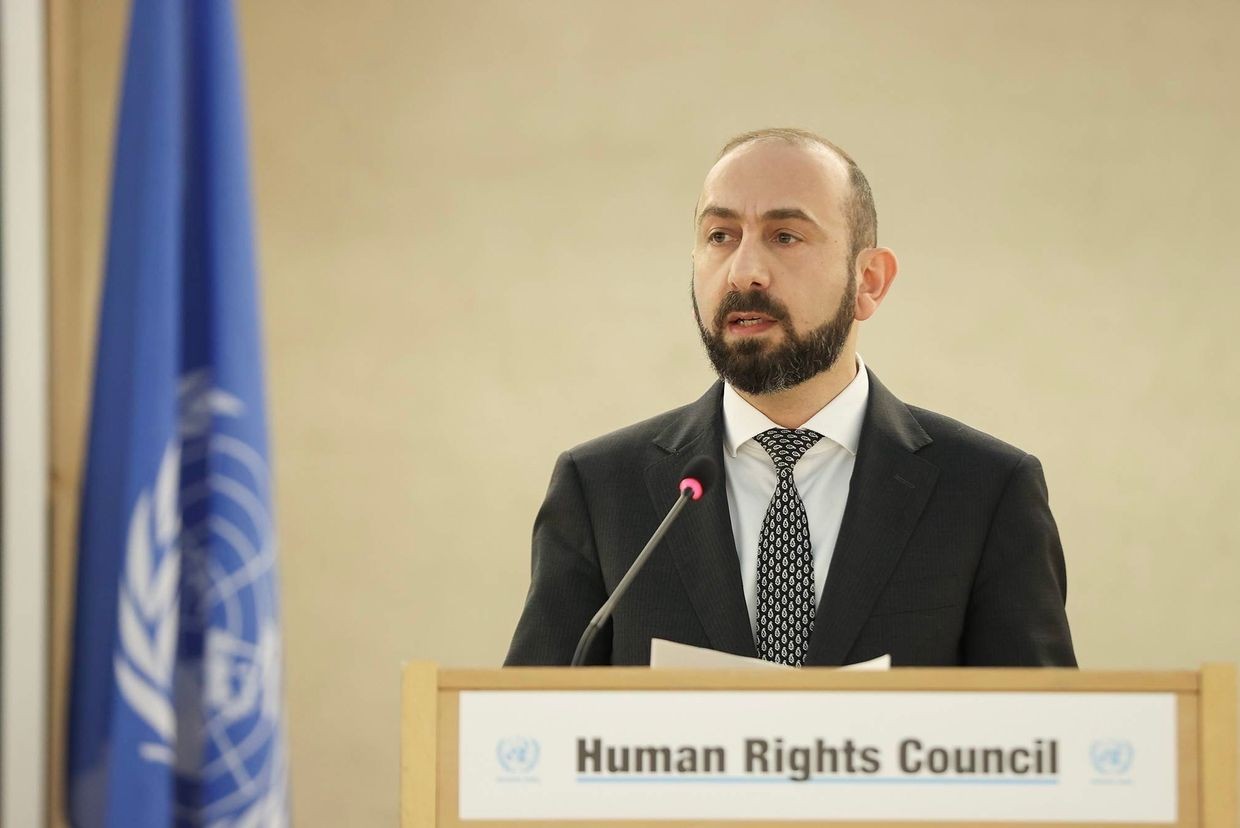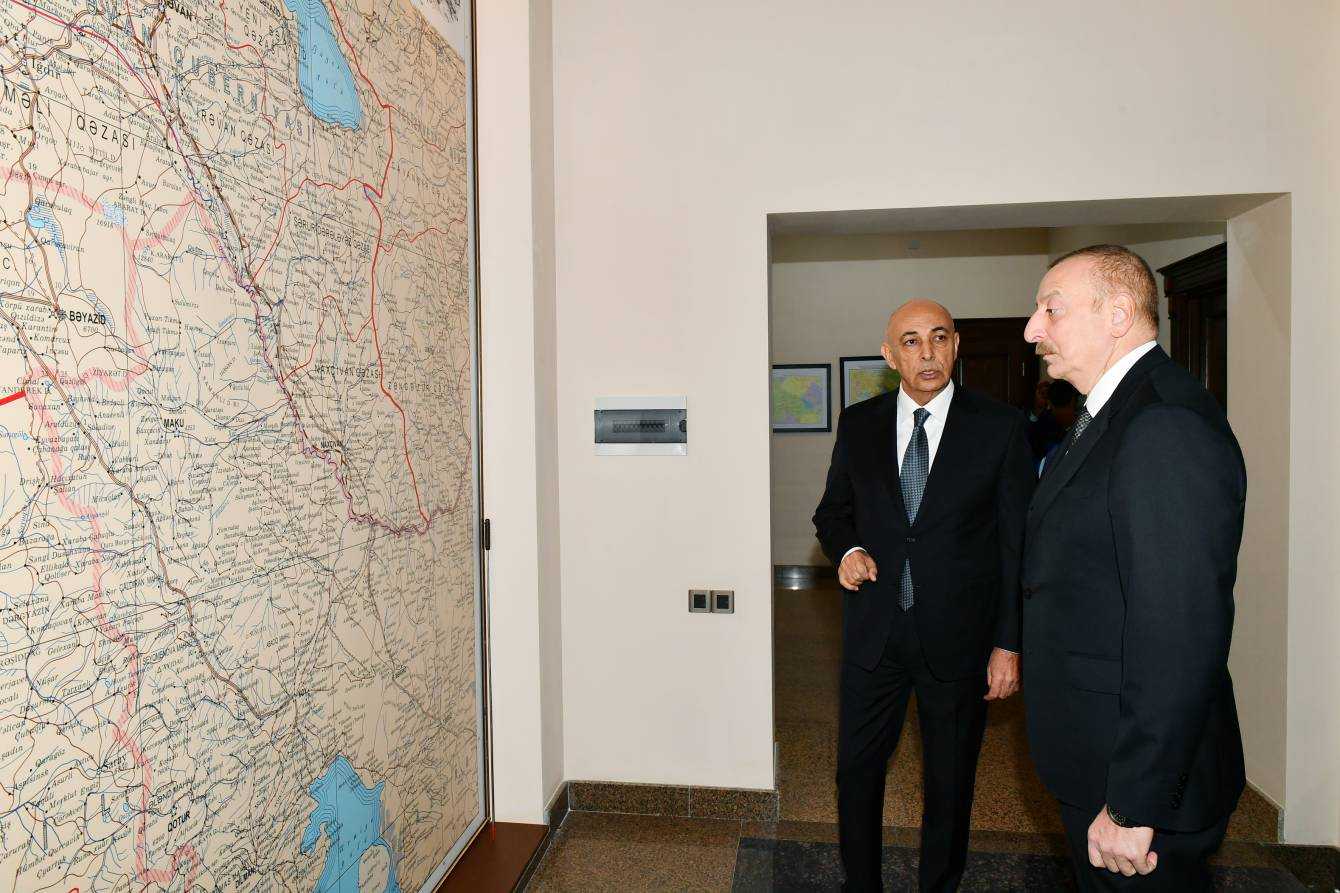Armenia’s foreign minister defends Nagorno-Karabakh Armenians detained and tried by Azerbaijan

In an official visit to Geneva, Armenian Foreign Minister Ararat Mirzoyan twice criticised Azerbaijan’s detention and trials against Nagorno-Karabakh Armenians — including former officials — marking the first time Armenia broached the matter at an international level.
‘As we speak, the mock trials against 23 Armenian individuals — who are arbitrarily detained, are taking place in Azerbaijan with a disregard to human right standards for due process’, Mirzoyan said in his speech at the Human Rights Council session on Monday.
This marked the first instance of Armenia issuing an official statement about the ongoing trials of former Nagorno-Karabakh officials at an international level.
At least 16 Nagorno-Karabakh Armenians, including ex-officials, are currently on trial in Azerbaijan for a total of 2,548 crimes, including genocide, slavery, enforced disappearance of persons, torture, financing of terrorism, and the creation of a criminal association.
In late January, Armenian Prime Minister Nikol Pashinyan expressed concern that the trial was ‘not only seriously worrying, but will be, and is being used to provoke new escalations in the region’.

During his speech on Monday, Mirzoyan also said that Azerbaijan continued to ‘question the territorial integrity of Armenia’, despite both countries recognising each other’s territorial integrity based on the 1991 Alma-Ata Declaration.
He said that Armenia made several ‘constructive proposals’ regarding the opening of transport infrastructure and mutual arms control.
‘We remain convinced that constructive response and further engagement and demonstration of political will of both parties will largely contribute to opening a new era of peace in our region’, Mirzoyan said.
On the same day, during a meeting with the President of the International Committee of the Red Cross, Mirjana Spoljaric Egger, Mirzoyan again spoke about ‘Armenian prisoners of war and civilians’ who were ‘illegally detained in Azerbaijan [and] the ongoing sham trials’.
Mirzoyan expressed concern over the health condition of the prisoners and ‘the possible pressure exerted on them’.
Azerbaijan put a number of former Nagorno-Karabakh officials and other representatives on trial in mid-January.
Photos from the trial published by Azerbaijan were the first to have been published of most of the prisoners since their arrest in September 2023, following the surrender and dissolution of Nagorno-Karabakh. Many of them looked visibly emaciated.

Among them was also Nagorno-Karabakh’s former State Minister, Ruben Vardanyan, who on 18 February, began his second hunger strike in protest against his detention and trial.
Following his first hunger strike in April 2024, Vardanyan’s lawyers filed three separate legal actions against Azerbaijan, accusing it in one of the cases of mistreating him while on hunger strike, which they argued constituted a form of torture.
‘Obligation of Azerbaijan’
Azerbaijan’s Deputy Foreign Minister, Elnur Mammadov, was swift to respond to Mirzoyan’s statements about the former Nagorno-Karabakh officials and other representatives in its custody and the peace talks.
‘This is not only the right, but an obligation of Azerbaijan under international law to hold to account those suspected of having committed war crimes’, Mammadov said in response, claiming that they had and would ‘ensure all the procedural rights of those accused in accordance with the international standards of due process, and justice will be served’.
Mammadov noted that Armenia and Azerbaijan ‘registered significant progress’ in their peace talks in 2024, but reiterated previous Azerbaijani claims that Armenia’s constitution contained territorial claims against Azerbaijan.
‘At this point, we expect Armenia to eliminate the key barrier in the normalisation process which is to legally abandon territorial claims against Azerbaijan through the constitutional amendments’, he said.
Azerbaijani officials, including President Ilham Aliyev, have repeatedly stated that Armenia’s constitution contained territorial claims against Azerbaijan. The constitution references Armenia’s Declaration of Independence in its pre-amble, which includes a joint decision by the Armenian Soviet Socialist Republic and the Karabakh Council to ‘reunify the Armenian SSR and the Mountainous Region of Karabakh’.
Mammadov cited the ‘calls of the Western Azerbaijan community’ to Armenia to launch a dialogue to return ‘more than 250,000 Azerbaijanis expelled from Armenia during the early years of the conflict’.
He said that these calls were ‘deliberately misinterpreted’ by Armenia as territorial claims by Azerbaijan.
‘Western Azerbaijan’, an irredentist concept frequently used by Azerbaijani authorities to lay claim to the territory of modern-day Armenia.
He also said that that issue ‘requires due consideration by the relevant UN mechanisms’.
On 24 February, the deputy speaker of Azerbaijan’s Parliament, Ziyafet Askerov, claimed that the opening of the ‘Zangezur corridor’ — an Azerbaijani proposal to establish a corridor connecting mainland Azerbaijan and its exclave of Nakhchivan — and Armenia’s constitution were the two sticking points of the peace treaty.
Armenia has dismissed Askerov’s claims, saying the two sticking points in the peace talks were the deployment of ‘third party forces’ — a reference to the EU Monitoring Mission on the Armenia–Azerbaijan border which patrols the Armenian side — and ongoing international lawsuits filed by the two countries against each other, which had previously been confirmed by both sides as non-agreed articles of the treaty.

For ease of reading, we choose not to use qualifiers such as ‘de facto’, ‘unrecognised’, or ‘partially recognised’ when discussing institutions or political positions within Abkhazia, Nagorno-Karabakh, and South Ossetia. This does not imply a position on their status.










